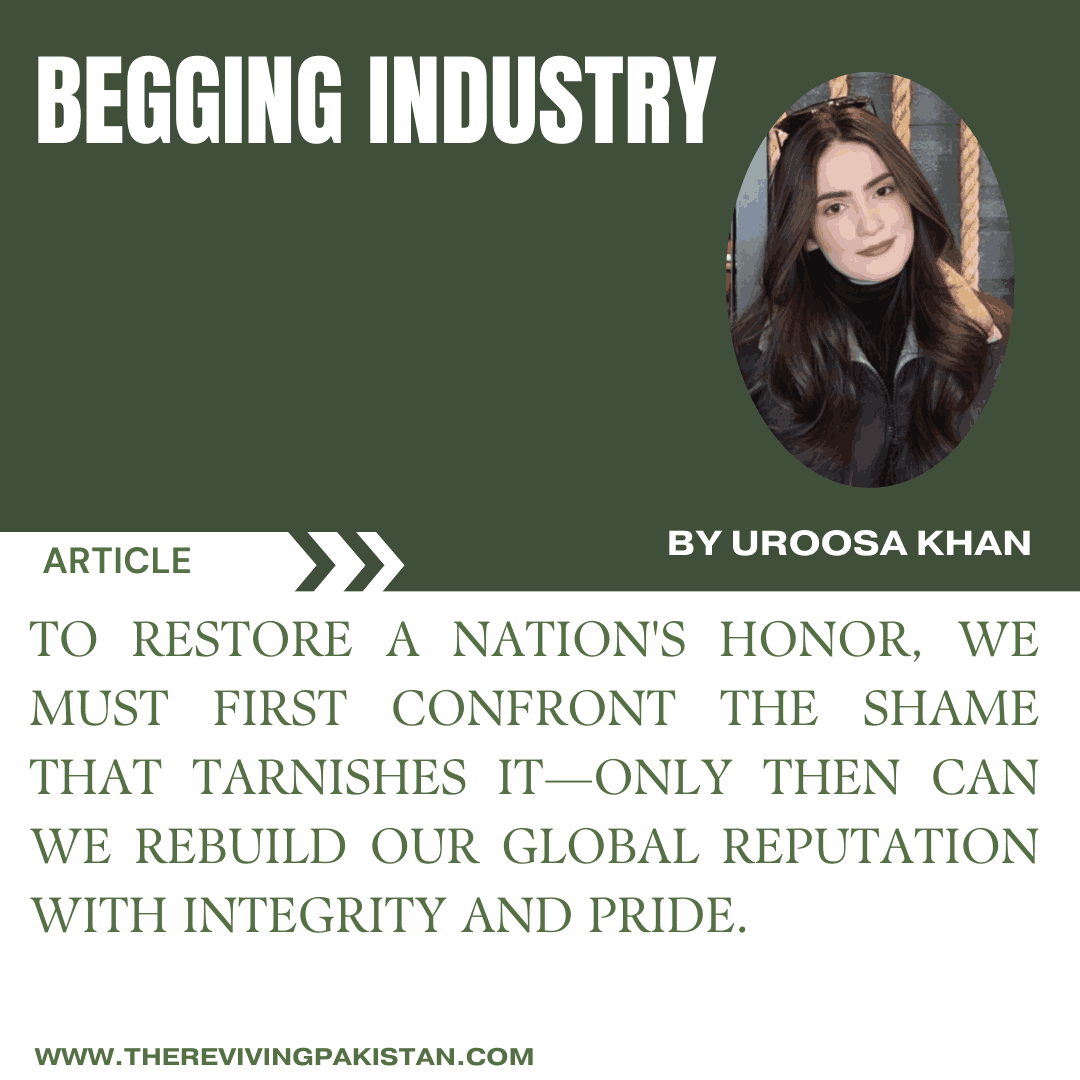About the Author(s)

Uroosa Khan
The author is an independent researcher having keen interest in foreign policy, geopolitics, and international relations.
To restore a nation’s honor, we must first confront the shame that tarnishes it—only then can we rebuild our global reputation with integrity and pride.
The country, which was once known to have played an important role abroad by providing labor, has changed its glory into an international crisis due to the increasing trend of exports in criminal and beggars. While countries like Bangladesh, India, and Sri Lanka are emerging as powerful nations in the international arena with the proficient services of their diaspora, Pakistan is not able to keep its image intact internationally. Unfortunately, this negative trend is to a great extent underscored by an alarming surge of criminalities in the Gulf region where a substantial number of the perpetrators were Pakistanis. In a more disturbing trend, the country has earned notoriety for exporting beggars-an occurrence that has gradually assumed the dimension of a national malaise and is fast denting the reputation of Pakistan abroad.
The shockingly large and well-organized “begging industry” of Pakistan adds approximately 42 billion rupees, over 12 percent of Pakistan’s GDP, into the national treasury. It is an industry that runs just like any other formal business, replete with highly organized groups who control prime begging locations and have even expanded their operations internationally. These gangs send beggars abroad much of the time to Saudi Arabia, the United Arab Emirates, Iraq, and Iran, thereby bringing a bad name to Pakistan and decreasing the value of the Pakistani passport. The beggars extract around 32 billion rupees from people’s pockets every day, reports revealed, saying this was the massive profit these firms get without much investment in this illicit industry. This trend has taken one of the most shameful sides through those organized groups that turned into professional networks.
They exploit every available legal loophole to export beggars abroad, particularly in the Gulf countries, by using Umrah visas. Once they reach their destination, they are bound, by their contract, with the owners who handle them to hand over a big portion of the money they collect. In fact, such networks are not limited only to the Middle East; the same trends have lately been reported in Iraq and Iran and even in Turkey. This shameful practice has come under international scrutiny, especially from the host countries themselves, due to which Pakistan is steadily losing its standing in the international arena. Saudi Arabia, one of the closest friends of Pakistan, has been very loud in its complaints against this lot of Pakistani beggars. Over 90 percent of the beggars found in Saudi Arabia and the UAE are of Pakistani origin; this has prompted the Saudi government to ask Pakistan to take immediate action to stop the flow of beggars into their country.
In fact, the Saudi Arabian authorities have become increasingly irritated with the problem, not least because it reflects poorly on Pakistani workers, of which many are skilled and valuable to the Saudi economy. The government of Pakistan has reacted to complaints that it is doing something about the problem. It has mobilized the FIA to forestall the travel of beggars abroad on the pretext of religious pilgrimages or any other legality that comes their way. While there is effort to track and break the organized networks behind such operations, the task is really gigantic.
Due to the magnitude of the problem and the huge amounts of money, these gangs are very resilient to government efforts and continue finding new ways of evading detection. However, the problem does not stop at the export of beggars. Over time, Pakistanis residing and working abroad have gotten themselves increasingly involved in criminal activities, particularly in Gulf countries and Turkey. Some have been implicated in harassment scandals and cases of illegal nude video recording, and other forms of criminal misconduct.
These incidents not only destroy the reputation of the individuals involved but also put a question mark over the entire lot of manpower working abroad from Pakistan and contribute further to complicating efforts at image improvement of the country. Cases involving sexual harassment and explicit video circulation of women by Pakistani nationals in countries such as Turkey and the UAE have certainly raised public uproar. Such behaviors besides grossly violating the moral constitutions of such societies also lie as a dent on diplomatic relations between Pakistan and the host country. Another important dimension of the problem is the economic one. Unlike other countries, such as India, Pakistan exports low-skilled workers into the Gulf region. Indian workers are highly technical and professional, contributing to their country’s burgeoning international standing.
Conversely, the contribution of labor export in Pakistan still stays in menial jobs, with an added effect on negativity of reputation due to rising crime rates and beggar influx. The disparity is even more serious when comparing the types of labor that both countries export: in contrast to India, which remains the prime source for the Gulf when it comes to skilled professionals like engineers, health workers, and those with expertise in information technology, it also builds a good reputation and influence in the region. On the other hand, Pakistan lags behind in exporting skilled labor and due to the criminal activities of a few of its nationals abroad, is helping to create an increasing sense of mistrust. The problem of Pakistan’s image is compounded by the internal dynamics of its economy which, in the first place, allows such an extensive begging industry to thrive. The emergence of organized begging groups, whether from within or outside the country, is no longer strictly an economic concern but has evolved to become a social issue as well. Such groups have now grown strong that their operations are almost unimpeded by law enforcement agencies and other concerned government departments.
Most of such groups utilize the money gathered through begging for funding other more serious criminal activities like human trafficking, drug smuggling, and even terrorism. The deep-seated corruption within this system also allowed the begging industry to flourish and extend operations abroad. Hence, it is a multi-faceted problem that needs a comprehensive solution. The government of Pakistan has to address this growing crisis on many fronts: crack down on the organized begging networks within the country; empower the law enforcement agencies to dismantle these groups and send beggars abroad and bring the perpetrators to book. That can only happen when there is a strong political will, effective legislation, and greater coordination between the local and international law-enforcing bodies. For one, Pakistan has to invest in human capital
Diplomatic relations must be improved to regain the country’s lost image internationally. Pakistan should also work with the host countries to rebuild trust and demonstrate its seriousness in addressing the challenge. It may be in the form of bilateral agreements that provide for regular checking of labor movement and not exportation of beggars and information drives to educate the Pakistanis regarding adherence to legal and ethical standards of the countries they will work in. In short, the standings of Pakistan abroad have come to a critical moment. While other countries like India and Bangladesh are carving a niche for themselves with their skilled labor force, Pakistan is in danger of being left behind, weighed down by the actions of criminal networks and the export of beggars.
It goes without saying that firm action to resolve these issues will bring back the standing of Pakistan in the international community and promise a rosier future for the people of Pakistan abroad. It is necessary to rid the country of this organized begging industry, enhance the quality of its labor force, and earn back some of the lost confidence of its partners on the global stage.

